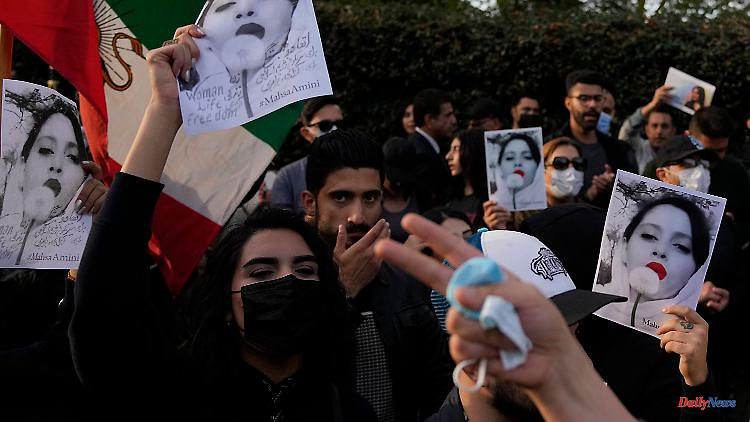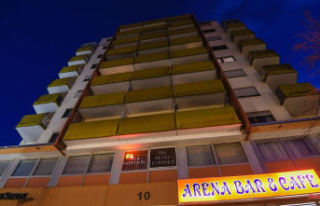Shots and burning cars - for ten days after the death of a young woman in Iran, people in Iran have been taking to the streets with their anger and desperation. The government is cracking down, there are arrests and more and more deaths. There are also protests outside the country. Meanwhile, ambassadors from Western countries are being summoned to Tehran.
After the death of a young woman in Iran, thousands of people took to the streets at the weekend against the Islamic system of rule and the systematic discrimination against women. At the same time, Iranian state media reported counter-demonstrations in the capital Tehran and other cities on Sunday. Thousands of people took part in the gatherings to condemn the ongoing protests by critics of the regime, it said.
According to eyewitness reports, both security forces and demonstrators are becoming increasingly aggressive during the protests. More shots can be heard. As the Iranian state broadcaster IRIB reported on Sunday, 41 people have now been killed. The human rights organization Iran Human Rights (IHR) in Oslo put the number of demonstrators killed on Sunday evening at at least 57. According to official information, the police arrested more than 1,000 people within two days in the north of the country alone. According to the Iranian Association of Journalists, at least nine reporters who wanted to report on the protests were arrested.
The demonstrators' calls against the Islamic leadership became more radical: in addition to "Death to the dictator", the demonstrators also chanted "This is the year of bloodshed!" and "We'd rather die than continue to endure humiliation!". According to eyewitnesses, young demonstrators in particular damaged public facilities, set cars and garbage cans on fire and beat up police officers. In response to the protests, the government severely restricted access to the internet. Mobile radio networks in particular hardly work at all. This makes it difficult for the demonstrators to organize themselves.
President Ebrahim Raisi once again threatened a crackdown. The head of the Iranian judicial authorities, Gholamhossein Mohseni Edschei, also announced on Sunday that he would take "decisive action without forbearance" against those responsible for the "unrest". The human rights organization Amnesty International accuses the security forces of "deliberately and unlawfully" using live ammunition to target protesters to disperse. Meanwhile, concerns have been raised about unconfirmed reports that the Iranian government may also be using Hezbollah militias from Lebanon to quell the protests.
The demonstrations were triggered by the death of 22-year-old Iranian Kurd Mahsa Amini. She had been arrested by the vice squad for violating the strict Islamic dress code. What exactly happened to Amini after her arrest is unclear. It is known that she initially fell into a coma and died in a hospital on September 16.
Since the Islamic Revolution in 1979, Iran has had strict dress codes that are monitored by the moral guardians. Women who, according to the religious police, break the dress code can be arrested on the street - like Amini. In the big cities in particular, many women now see the rules as rather relaxed and, for example, only wear their headscarves on the back of their heads - to the annoyance of ultra-conservative politicians. Religious hardliners have been trying for months to enforce Islamic laws more strictly.
Rallies in support of the Iranian protests took place in numerous cities around the world - including Berlin, Brussels, Istanbul, Madrid, New York and Paris. In Paris on Sunday, police used tear gas to prevent hundreds of protesters from breaching the cordon near the Iranian embassy. According to the police, around 4,000 people took part in the demonstration. According to the police, five demonstrators who had also tried to force their way to the Iranian embassy were arrested in London.
EU foreign policy chief Josep Borrell condemned the Iranian security forces' crackdown on the protests as "unjustified and unacceptable". The Iranian Foreign Ministry meanwhile blamed the arch-enemy USA for the protests and warned against a reaction by Iran.
The ministry also said on Sunday that it had summoned the UK ambassador to protest "prompts for riots" on London-based TV stations broadcasting in Farsi. This is seen as "interference in the internal affairs of the Islamic Republic of Iran and an act against the national sovereignty of our country". Norway's ambassador was also summoned to answer questions about "interference and non-constructive comments on Iran's internal affairs" made by the speaker of the Norwegian parliament.












